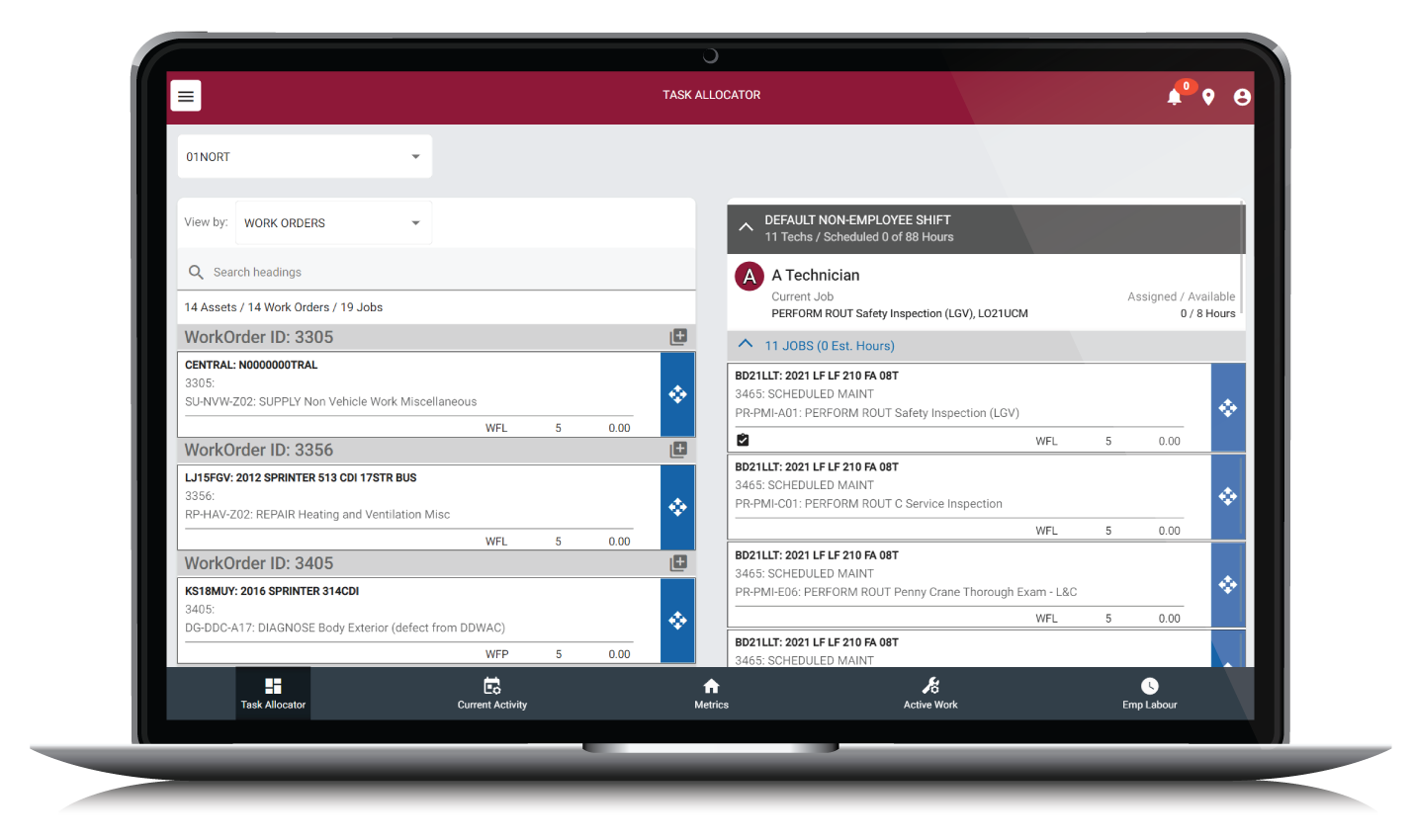Every minute saved translates into improved productivity and enhanced performance. AssetWorks FleetFocus revolutionises maintenance operations, empowering fleet managers to streamline processes, optimise resource allocation, and maximise efficiency. Let’s delve into how FleetFocus transforms maintenance operations, saving valuable time and driving operational excellence.
Anticipate Maintenance Needs with Preventive Maintenance Forecasting
With FleetFocus‘ Preventive Maintenance Forecasting, fleet managers can proactively schedule maintenance tasks to align with operational requirements and regulatory compliance. By setting up user-defined preventive maintenance jobs based on meter readings, time intervals, or usage parameters, FleetFocus automates the scheduling process, minimising asset downtime and optimising resource utilisation. For example, fleet managers can effortlessly forecast maintenance schedules for each vehicle in their fleet, ensuring timely servicing and reducing the risk of unexpected breakdowns.
Preventive Maintenance Forecasting plays a crucial role in fleet management for several reasons:
- Minimising Downtime: By anticipating maintenance needs before they escalate into critical issues, fleet managers can schedule preventive maintenance tasks during off-peak hours or downtime, minimising disruptions to operations.
- Preventing Breakdowns: Regular maintenance helps identify and address potential issues before they lead to breakdowns or failures. By proactively servicing vehicles based on forecasted maintenance needs, fleet managers can prevent costly breakdowns and ensure fleet reliability.
- Extending Asset Lifespan: Regular maintenance extends the lifespan of fleet assets by addressing wear and tear, reducing the risk of premature failures, and maximising asset utilisation. Preventive Maintenance Forecasting ensures that maintenance tasks are performed at optimal intervals to prolong asset lifespan.
- Enhancing Safety: Well-maintained vehicles are safer to operate, reducing the risk of accidents and ensuring driver safety. Preventive Maintenance Forecasting helps fleet managers stay ahead of maintenance requirements, ensuring that vehicles are in optimal condition and compliant with safety regulations.
- Optimising Operational Efficiency: By anticipating maintenance needs and scheduling preventive tasks efficiently, fleet managers can optimise fleet availability and operational efficiency. Vehicles are kept in optimal condition, minimising unexpected downtime and maximising productivity.
Preventive Maintenance Forecasting is essential for fleet managers as it helps anticipate maintenance needs, prevent breakdowns, extend asset lifespan, enhance safety, and optimise operational efficiency, ultimately leading to cost savings and improved fleet performance.

Optimise Resource Allocation with the Workshop Planning Module
The Workshop Planning Module in FleetFocus empowers fleet managers to efficiently manage workshop operations and allocate resources effectively. By identifying current workshop demands and matching them with available resources, fleet managers can optimise workforce and equipment utilisation, reducing idle time and maximising productivity. FleetFocus enables fleet managers to create an optimised planning schedule by day, shift, week, or month, ensuring that maintenance tasks are completed efficiently and in a timely manner. For instance, fleet managers can utilise the Workshop Planning Module to identify and address resource constraints, preventing bottlenecks and minimising operational downtime.
The Workshop Planning Module is crucial for fleet management due to its ability to optimise resource allocation in several key ways:
- Minimising Downtime: By effectively planning maintenance tasks and allocating resources, fleet managers can minimise downtime by ensuring that vehicles are serviced promptly and efficiently. This reduces the likelihood of vehicles being out of service for extended periods, thereby maximising fleet availability and operational efficiency.
- Maximising Productivity: Efficient resource allocation ensures that workshops are adequately staffed and equipped to handle maintenance tasks as efficiently as possible. By optimising the use of available resources, fleet managers can maximise productivity and throughput, allowing them to service more vehicles in less time.
- Balancing Workload: The Workshop Planning Module allows fleet managers to balance the workload across different shifts and workshops based on demand and resource availability. This ensures that maintenance tasks are distributed evenly, preventing overloading of resources and avoiding bottlenecks in the maintenance process.
- Meeting Customer Demand: By optimising resource allocation, fleet managers can better align workshop capacity with customer demand. This enables them to meet service level agreements and customer expectations more effectively, enhancing overall customer satisfaction and retention.
- Improving Cost Efficiency: Effective resource allocation helps fleet managers optimise the use of labour, equipment, and other resources, reducing unnecessary costs and improving cost efficiency. By minimising idle time and maximising utilisation, fleet managers can achieve cost savings while maintaining service quality.
The Workshop Planning Module is essential for fleet managers as it enables them to optimise resource allocation, minimise downtime, maximise productivity, balance workload, meet customer demand, and improve cost efficiency. By leveraging this module effectively, fleet managers can enhance overall operational efficiency and performance.

Streamline Maintenance Workflow with the Work Order Management Module
FleetFocus‘ Work Order Management module streamlines the entire maintenance workflow, from job creation to completion. Fleet managers can effortlessly manage workshop operations, job assignments, warranty work, and supplier repairs within a single platform. By customising workflows and job order formats, fleet managers can tailor the system to their specific operational requirements, enhancing efficiency and reducing administrative overhead. FleetFocus enables fleet managers to track maintenance activities, monitor job progress, and capture workshop labour effectively, ensuring compliance and maximising cost efficiency. For example, fleet managers can utilise the Work Order Management module to streamline maintenance processes, minimise paperwork, and improve overall operational efficiency.
Work Order Management is vital for fleet management as it significantly enhances operational efficiency and ensures smooth maintenance workflow. Here’s why it’s crucial:
- Efficient Task Coordination: Work Order Management allows fleet managers to coordinate and manage maintenance tasks seamlessly. By centralising all work orders within a single platform, fleet managers can efficiently assign tasks to technicians, track progress, and ensure timely completion of maintenance activities.
- Optimised Resource Utilisation: With Work Order Management, fleet managers can allocate resources more effectively. They can assign the right technician with the necessary skills and expertise to each task, ensuring that resources are utilised optimally and that tasks are completed efficiently.
- Reduced Downtime: By streamlining maintenance workflows, Work Order Management helps reduce downtime for fleet vehicles. Maintenance tasks are scheduled and prioritised based on urgency, allowing fleet managers to address critical issues promptly and minimise the impact on fleet operations.
- Improved Compliance: Work Order Management facilitates better compliance with maintenance schedules and regulatory requirements. Fleet managers can set up automated reminders for routine maintenance tasks and track compliance with service intervals, ensuring that vehicles remain in optimal condition and meet regulatory standards.
- Enhanced Data Visibility: Work Order Management provides fleet managers with real-time visibility into maintenance activities and performance metrics. They can track key performance indicators, such as repair times and costs, identify areas for improvement, and make data-driven decisions to optimise fleet maintenance processes.
- Cost Savings: By streamlining maintenance workflows and improving resource utilisation, Work Order Management helps reduce maintenance costs for fleets. It minimises unnecessary downtime, prevents costly breakdowns, and ensures that maintenance tasks are carried out efficiently, ultimately leading to significant cost savings.
Work Order Management is essential for fleets as it streamlines maintenance workflows, optimises resource utilisation, reduces downtime, ensures compliance, enhances data visibility, and enables cost savings. By leveraging Work Order Management effectively, fleet managers can improve overall operational efficiency and maximise the lifespan of their fleet assets.
FleetFocus revolutionises maintenance operations, empowering fleet managers to optimise resource allocation, streamline workflow processes, and maximise efficiency. By leveraging advanced features such as Preventive Maintenance Forecasting, Workshop Planning Module, and Work Order Management, fleet managers can save valuable time, enhance productivity, and drive operational excellence.












